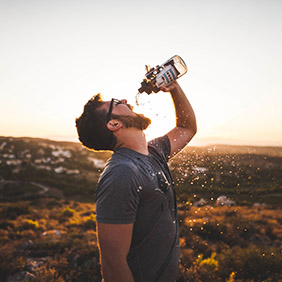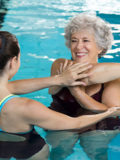By Rachel Cavotta
Do you get tired quickly while exercising? Are you are have trouble getting rid of pesky headaches?
It might be because you aren’t drinking enough water.
Since our bodies are 55-65% water it’s safe to say this liquid is pretty important, but why? And what happens when we don’t drink enough water throughout the day?
As it turns out, that there are plenty of ways water plays a role in feeling good and living a healthy lifestyle, and measuring the amount of water you drink everyday may not be as difficult as you thought.
How Dehydration Affects the Body
Dehydration, or a loss of water from the body, can be a much more serious condition than you might have imaged. Water loss can affect many aspects of your health, according to Tufts University researchers, Barry Popkin, Ph.D., Kristen E. D’Anci and Irwin Rosenberg, M.D
Physical Performance
When doing any type of physical activity hydration is the key to having a successful workout. Athletes can lose 6 to 10% of their body weight through sweat loss which leads to dehydration if the fluids are not replenished.
Once you start to dehydrate, your athletic performance suffers. You can begin to suffer from reduced endurance, increased fatigue, and “altered thermoregulatory capability” (the process that allows your body to maintain its core temperature 98.6 degrees). All of this puts a huge strain on your body and makes it much harder to stay motivated while working out.
Of course, it is important to remember to drink water while exercising in hot temperatures. Inadequate fluids are associated with conditions such as hyperthermia (when the body temperature goes above normal and cannot be regulated), decreased blood pressure, and reduced blood flow to the muscles.
You may not drink enough water during a workout if you only drink when you are thirsty. To prevent dehydration, it is best to drink water before and during physical activity, even when you’re not thirsty. This can help prevent high levels of dehydration.
Kidneys
Your kidneys are important for regulating fluids and removing waste from your body. Kidneys function better with more water in the system. A lack of fluids in your body can force your kidneys to work twice as hard to filter the waste from your body. This can wear out the tissue in these vital organs. By drinking more water, you can help your kidneys by giving them a lot less work.
Skin
There are a number of myths which claim water can improve skin complexion by providing a more “moisturized look.” However, there is very little evidence which actually supports the beauty claim that drinking 8 to 10 glasses of water a day can give you glowing skin.
Despite the false ideas about cosmetic utility, our skin contains 30% water. This gives our skin plumpness and elasticity. Skin is also important for preventing water loss into the environment, and maintaining the right amount of water levels in our bodies.
Our skin is essentially a “waterproofing” system, controlling the amount of water that leaves our bodies through sweating.
Headache
No one likes to get headaches. Dehydration can lead to the development of headaches and migraines.
Though there is no concrete evidence which supports that drinking more will actually prevent headaches, certain observational studies have showed that increased rehydration can help ease migraines and headaches triggered by dehydration within 30 minutes to 3 hours.
How Much Water Should We Drink?
We know water is good for us, but how much should we actually be drinking? The current recommendation is about eight glasses of water day. However, recent studies suggest that this amount is not as accurate as we previously thought.
Your body actually tries to tell you when enough is enough. A “swallowing inhibition” is activated when you drink too much water so say researchers at Monash University in Melbourne, Australia.
The researchers discovered increased activity displayed in brain scans of participants trying to swallow water after they were no longer thirsty. The conclusion? Your brain starts telling your swallowing reflex that your body is no longer thirsty, and it time to stop drinking.
When it comes to knowing how much water to drink, just listen to what your body is telling you! No measuring required.
Drink and Be Merry
Overall, water is pretty amazing. It helps us with our physical performance and can even be associated with eating right and exercising more frequently.
Though there is a variety of information about how much water to drink and what it can do to help us, it is important to drink the amount that is right for you.
So take a sip. Remember that water keeps us healthy and that makes us happy.











